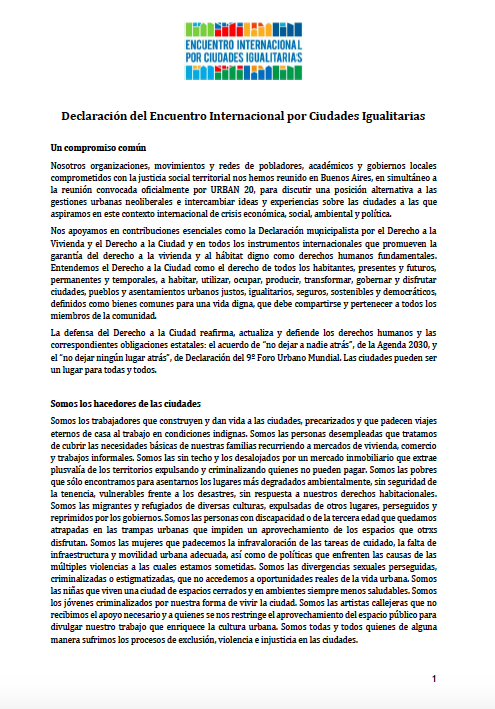Land consumption by urban expansion and traffic facilities is one of the main reasons of environmental degradation worldwide. The indiscriminate access to land, on the other hand, is a strategic prerequisite for the provision of adequate housing for all and for the development of sustainable human settlements. Hence, land management policy is mostly dominated by powerful real estate interests and not by a democratically controlled public administration, which is in condition to balance social and ecological principles. For the social control of urban land use! Land consumption by urban expansion and traffic facilities is one of the main reasons of environmental degradation worldwide. The indiscriminate access to land, on the other hand, is a strategic prerequisite for the provision of adequate housing for all and for the development of sustainable human settlements. Hence, land management policy is mostly dominated by powerful real estate interests and not by a democratic controlled public administration, which is in condition to balance social and ecological principles. We demand: – The community right over collective lands should be maintained and protected being the basis for environmental protection. – Governments and cities should be committed to provide access to land for social production of habitat. – Governments and cities should introduce a gradual taxation on lands unfarmed or on real estate unoccupied for speculative reasons. – Indiscriminate access to land and security of tenure are basic strategic prerequisitse for the provision of adequate housing for all and for the development of sustainable human settlements. – Governments and cities should be committed to provide access to appropriate and affordable land for social housing, cooperative housing and self-construction sector in inner-urban districts in accordance to the principles of sustainable urban and regional development. – Governments and cities should be committed to provide adequate land inside all urban neighbourhoods for green areas, sport facilities, services and public places. – Governments and cities should be committed to the protection of ecological vulnerable zones, of mountains, woods and watery regions and to the protection of soils in general. This purpose includes the protection of ecological zones and agricultural soils in urbanized areas, especially those for fresh water generating and the promotion of urban and regional agriculture. The ecological costs of any consumption of soils or land have to be compensated by ecological measures. – Governments must work to guarantee and enforce the right of all inhabitants in rural and fringe-urban areas, and especially of the poor, to access to common property resources (CPR), such as forests, water bodies, and grazing lands, and work towards establishing the management of these resources either through community committees or jointly with agencies of the state (such as JFM – Joint Forest Management). – Agricultural food production in urbanized areas should be promoted as a contribution to urban ecology and health, resource protection, local economy and food security. – Governments and cities should commit not to promote or even subsidize new urbanizations outside the built-up urban areas, as long as appropriate development and urban densification possibilities inside the built-up urban areas exist. – Thus especially highly industrialized and urbanized regions with not expanding population like northern America and Europe immediately should stop their unnecessary growth of land consumption and sprawl and re-strengthen or improve existing urban areas and settlements while protecting ecologically vulnerable zones, regions for recreation and even agricultural land near urbanized areas.
Declaración del Encuentro Internacional por Ciudades Igualitarias
En el marco del U20, organizaciones sociales, movimientos populares, redes de la sociedad civil, integrantes de la academia y autoridades locales comprometidas con la igualdad, los derechos humanos y la sustentabilidad se reunieron en Buenos Aires para proponer un compromiso común por Ciudades Igualitarias.




